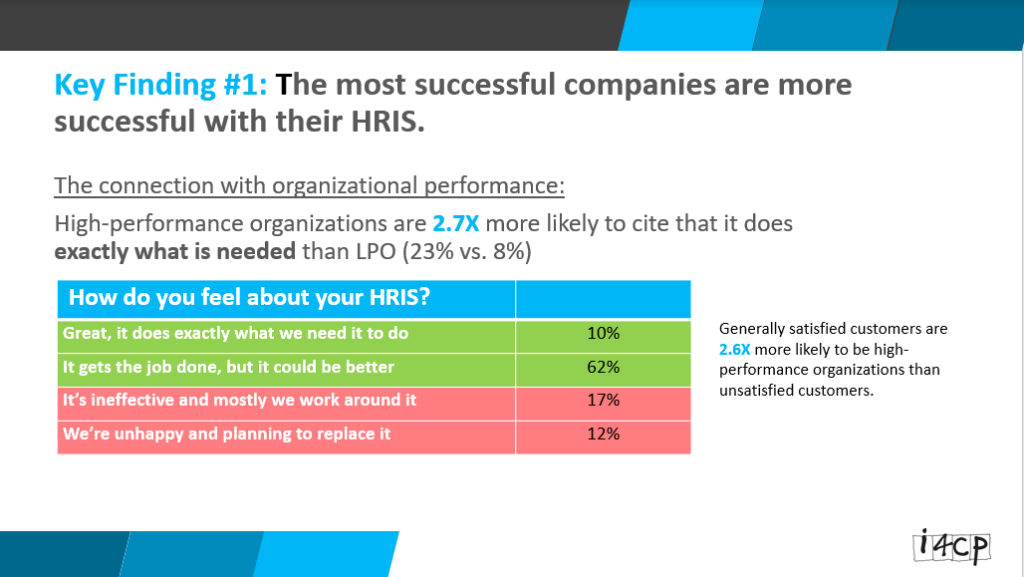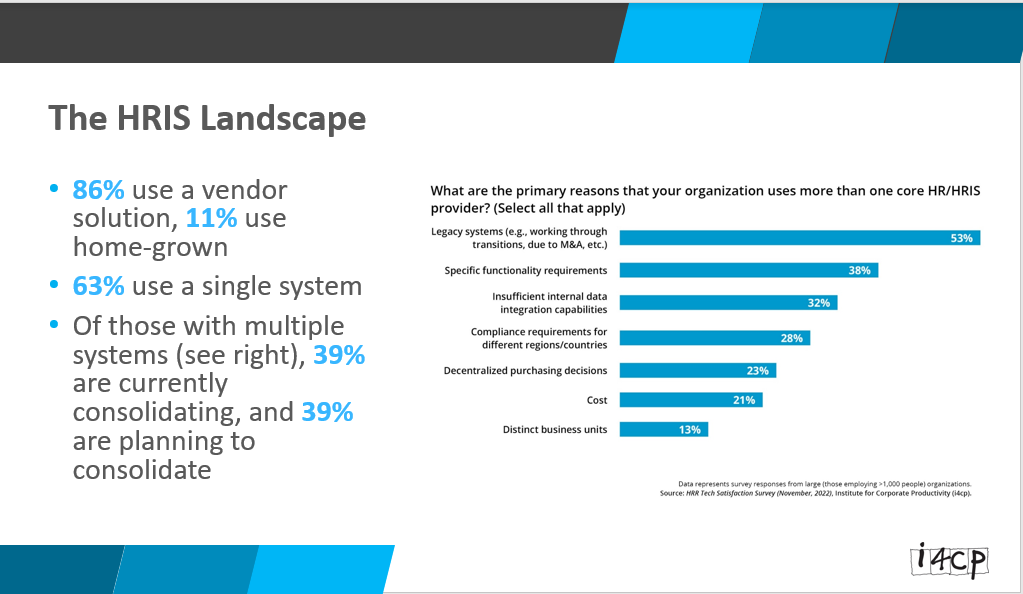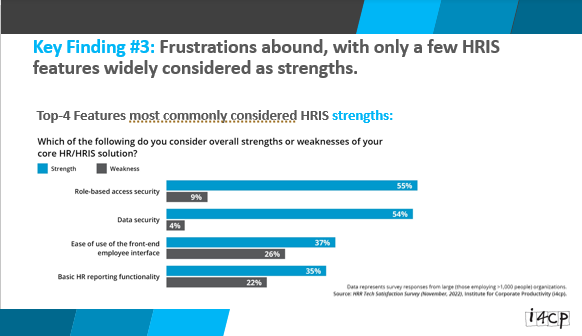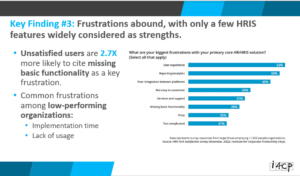Feeling frustrated as you wrangle with your human resource information system (HRIS)?
Well, you’re far from being alone.
It turns out that 17% of human resource leaders find their HRIS is ineffective and requires workarounds while another 12% are unhappy and planning to replace it, according to a recent survey of more than 400 HR leaders by human capital management research firm i4cp.
But, even more importantly, i4cp researchers found the effectiveness of an HRIS can have a correlation to the performance of an organization.
This correlation, as well as how HRIS features are driving user satisfaction and frustration and also which HRIS systems are the most popular and how to select them, were among the hot button topics addressed in “The Good, The Bad and The Ugly of HRIS” during HRE’s HR Technology Conference Virtual, which runs through Thursday. (Registrants can listen to the session replay here until May 1.)
HRIS landscape
Core HR software and HRIS systems manage employee information and automate key HR processes, such as payroll, employee demographics, benefit tracking, health and safety data, and attendance, for example. Additional modules can also be added like talent acquisition, learning and development, and other talent management areas.
The vast majority of survey participants in i4cp’s research (86%) use a vendor’s HRIS, compared to 11% who build their own in-house. And 63% use a single system for their HRIS, compared to multiple vendors.
For those that use multiple systems, 78% said they plan to either consolidate their systems in the future or are currently consolidating them. In citing the reasons for the multiple systems, 53% of survey participants say it’s due to having older or legacy systems, while 38% attribute it to specific functionality requirements and 32% point to insufficient internal data integration capabilities.
How HRIS correlates with company performance
When it comes to high-performing companies—based on revenue growth, market share, profitability and customer satisfaction over a five-year period—23% say their HRIS does exactly what is needed, compared to 8% for low-performing companies.
“We actually found there was a connection between how you use your HRIS solution and how well it met your organization’s needs and your organization’s performance,” Mollie Lombardi, senior research analyst at i4cp, said during the HR Tech session.

These high-performance companies took several steps to capture the results they were seeking from their HRIS systems.
“When going through the selection and implementation process, we found high-performance organizations really involved a variety of perspectives when making HR technology decisions,” Lombardi said. “They gathered input from senior HR leadership, senior executives, HR IT specialists and general IT leaders.”
See also: Empathy and a DEI ‘lens’: Keys to fueling sustainable people practices
And satisfied HRIS users were 50% more likely to involve an HR IT specialist than unsatisfied users.
Additionally, high-performing companies that were achieving success with their HRIS tools were also focused on the technology’s ability to enable their organization to meet its goals and offer a return on investment, compared to low-performing companies that tended to base their HRIS selection on price and the functionality provided, said Lombardi.
Most popular HRIS platforms
Three industry titans are the most popular when it comes to HRIS and core HR software for organizations with 1,000 or more employees, according to the survey.
Workday captured the largest percentage of survey participants, followed by SAP’s SuccessFactors and Oracle’s PeopleSoft. (As an interesting aside, the co-founder of PeopleSoft, Dave Duffield, later went on to co-found Workday.)

“Workday came in a strong No. 1, with SAP SuccessFactors and Oracle’s older PeopleSoft implementation almost tied for No. 2,” said Tom Stone, senior research analyst at i4cp, during the session. “When we filtered the data down by smaller organizations, we didn’t see Workday, SAP or Oracle since they focus on the enterprise market. ADP and UKG were used a bit more often.”
Among companies with 100-999 employees, Ultimate Kronos Group (UKG) and ADP tend to be used more than the three industry giants, as well as BambooHR and Paycom, the survey found.
HRIS features driving satisfaction
Despite nearly a third of survey respondents being dissatisfied with their HRIS solution, there are some areas where survey participants still find strength in their platforms.
For instance, more than half of survey respondents believe their role-based access security and data security features in their HRIS remain strong.
“The need for security is very strong with HR people data and basic reporting functionality, as opposed to advanced analytics,” Stone said. “Largely, HRIS systems more often than not have done a fairly good job with security.”
CHART 3: “Key Finding #3: Frustrations Abound, With Only a Few HRIS Features Widely Considered Strengths”

Another area where HR leaders expressed satisfaction with the technology features was with new HRIS implementations.
“We’re not seeing a ton of rip and replace, but we see newer implementations are being rated significantly better in terms of user experience and non-employee information, like the gig workforce,” Lombardi said.
Related: Internal mobility, talent marketplaces are ‘life-or-death’ survival strategies
Stone noted employee self-service features are also viewed as a strength among users, whereas some onboarding, HR case management and HR management features are not typically viewed as positively.
HRIS attributes creating frustration
Topping the list of HRIS frustrations include achieving a good employee experience, reporting and analytics, and integration between platforms, according to the survey.
Companies often complain of limited functionality with their systems to enhance the digital employee experience and the frequent pain of trying to customize their system.

Customization is like a double-edged sword when it’s built on top of an existing HRIS because it often calls for making upgrades or changes down the road, while initially it’s expected to bring benefits. Customizations made in the cloud can also bring pain.
“The customizability piece is more of a pain point and weakness, especially as the industry has moved away from on-premise installations and more to the cloud,” Stone said. “Once you customize something that has a cloud upgrade, that’s where the pain point can come into play a bit more.”
Much of the frustration can be minimized if certain steps are taken in the selection and implementation process, said i4cp researchers.
“There is often a mismatch between what an organization thinks it needs or thinks is fine and what it actually gets,” Lombardi said.
Stone and Lombardi offer these tips:
- Contact a number of references before selecting your HRIS.
- Go beyond the cloud sales representative and have direct contact with the cloud vendor, since this is about building a relationship and not just buying software.
- Hire an HR IT specialist to advise you on your technology needs.
- Acquire an HRIS solution that brings strategic benefits, like EX, skill-centric talent processes and advanced analytics you can grow into.
These steps can help reduce the blame game that may arise with vendors and within your own organization should things go wrong.
“Both the customer and solution provider have some work to do when it comes to implementing things in a strong and go-forward way,” Stone said.
The HR Tech Conference Virtual runs through March 2. Click here to register.

